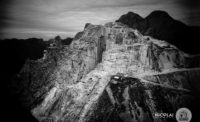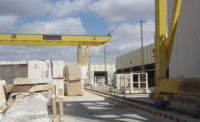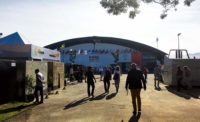For the last few years, the Natural Stone Institute (NSI) has been hosting groups of industry professionals to various countries around the world — including Brazil, China, Italy and Turkey — as part of its efforts to promote the use of natural stone in design. For the 45th edition of the Vitória Stone Fair/Marmo+Mac Latin America, a delegation of approximately 12 members travelled to Vitória, Brazil, to attend the stone exhibition, as well as to participate in some quarry and factory tours within the state of Espírito Santo (ES).
Two full days were dedicated to exploring the operations of four different Brazilian stone manufacturers and suppliers — Brasigran Granitos, Granitos Zucchi, Magban and Decolores Mármores e Granitos — before the beginning of the fair.
The first stop was Brasigran, which is located in Serra, ES, about 15 miles north of Vitória. A 35-year-old company, Brasigran originally began as a mining company, which now specializes in the production of granite, marble and quartzite. “The demand used to be for granite, but now it’s for quartzite,” said Renata Malenza, director of marketing. “However, we still produce mostly granites.”
Brasigran’s main factory in Serra has an impressive line-up of available materials in its large, semi-outdoor factory, which includes three CNC machines from GMM, block cutters from Pellegrini and a Galaxy B220 polisher from Pedrini.
After our stop at Brasigran, we ventured 100 miles southwest to Cachoeiro de Itapemirim, ES, to visit Granitos Zucchi’s 540,000-square-foot factory, which was built in 2014 to house a custom Simec line for exotic and specialty stones. The 25-year-old company is also starting to shift from primarily granites to quartzites, working with about 100 different quarries from various areas of the country. “The technology that has developed over the last 10 years has completely changed the industry,” said Leonardo Tatagiba, company director.
Currently, about 70% of the company’s exports go to the U.S. However, Zucchi also exports to Canada, Mexico, South America, Europe and Asia. With almost 200 employees and 18 different types of saws for cutting slabs, Zucchi is focused on providing only the highest quality materials. “We have always focused on high-end natural stones and bringing more and more new materials to the market, especially quartzites,” said Pablo Luiz Rocha Vieira, the company’s digital marketing manager. “In 2017, we launched the first marble industry 100% automated of all Americas. This investment has made us the first company who works with an exclusive marble line. Not only marbles from Brazil, but also from Italy, Namibia and Africa. Because of that, today we have the most complete high-end line of natural stones in Brazil.”
On the following day, our group returned to Cachoeiro de Itapemirim, which is located about 86 miles southwest of Vitória. We kicked off the day at Magban, an ever-growing quarrier and producer of dolomite marble, marble, granite and quartzite, where we were given an exclusive tour of a nearby quarry. With an expansive factory and an even larger quarry presence, the company currently operates 12 different sites throughout Brazil. Magban has 300 employees and aspires to be one of the largest exporters of ornamental stones in the region by 2020, according to company representatives.
Afterwards, we ventured to our last stop: Decolores Mármores e Granitos, located not too far from Magban in ES. This 18-year-old company also focuses on the production and sale of natural stone from Brazil, according to owner, Luca Burlamacchi. “In 2010, we started a joint venture in Italy with Carrara marble, establishing Decolores Italia, with a main focus of selling slabs of Italian marbles,” he said.
Currently, Decolores employs 110 people at its 1 million-square-foot complex in Cachoeiro de Itapemirim, with 130,000 square feet of factory and warehouse space. “We have several quarries, with a total production of around 2,000 tons per month,” Burlamacchi explained. “We quarry five types of stone, but have around 80 different varieties available at the warehouse.”
Alike Zucchi, the majority of Decolores’ exports are sent to the U.S. — approximately 75% to be exact. “We also sell to domestic markets and countries from all five continents,” he said.
Since new materials are always being discovered at Decolores, the company plans on expanding its main warehouse onsite by 50,000 square feet, which is planned for later this year or at the beginning of 2019.

















